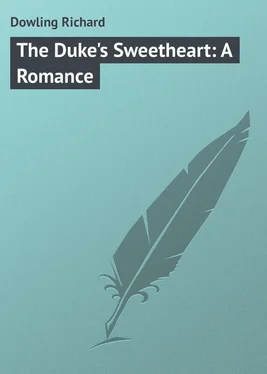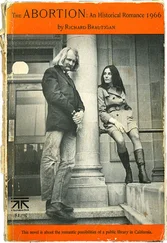Richard Dowling - The Duke's Sweetheart - A Romance
Здесь есть возможность читать онлайн «Richard Dowling - The Duke's Sweetheart - A Romance» — ознакомительный отрывок электронной книги совершенно бесплатно, а после прочтения отрывка купить полную версию. В некоторых случаях можно слушать аудио, скачать через торрент в формате fb2 и присутствует краткое содержание. Издательство: Иностранный паблик, Жанр: foreign_prose, на английском языке. Описание произведения, (предисловие) а так же отзывы посетителей доступны на портале библиотеки ЛибКат.
- Название:The Duke's Sweetheart: A Romance
- Автор:
- Издательство:Иностранный паблик
- Жанр:
- Год:неизвестен
- ISBN:нет данных
- Рейтинг книги:3 / 5. Голосов: 1
-
Избранное:Добавить в избранное
- Отзывы:
-
Ваша оценка:
- 60
- 1
- 2
- 3
- 4
- 5
The Duke's Sweetheart: A Romance: краткое содержание, описание и аннотация
Предлагаем к чтению аннотацию, описание, краткое содержание или предисловие (зависит от того, что написал сам автор книги «The Duke's Sweetheart: A Romance»). Если вы не нашли необходимую информацию о книге — напишите в комментариях, мы постараемся отыскать её.
The Duke's Sweetheart: A Romance — читать онлайн ознакомительный отрывок
Ниже представлен текст книги, разбитый по страницам. Система сохранения места последней прочитанной страницы, позволяет с удобством читать онлайн бесплатно книгу «The Duke's Sweetheart: A Romance», без необходимости каждый раз заново искать на чём Вы остановились. Поставьте закладку, и сможете в любой момент перейти на страницу, на которой закончили чтение.
Интервал:
Закладка:
Dowling Richard
The Duke's Sweetheart: A Romance
PART I.
THE DUKE OF LONG ACRE
CHAPTER I.
THE DUKE'S SWEETHEART
Charles Augustus Cheyne, Duke of Long Acre, had no land. Neither in the United Kingdom nor in any other state of earth did he own a perch of ground. He did not own mines or railways, or Consols, or foreign or domestic stock of any kind. All the money he had was the result of his own industrious fingers, of his own industrious brain. Neither the Heralds' College nor the Lord Chancellor had ever heard of the Duke of Long Acre. The title was one purely of courtesy, conferred upon him by his peers, who were no peers of the realm, but untitled citizens of the Republic of Letters. If he was no duke, he would have furnished sufficient material for making two dukes of satisfactory size, as dukes go now. He was six feet tall, measured fifty inches round the chest, and forty-two round the waist. He had a large, beaming, good-humoured face. He wore no hair on his face; the hair of his head was of a dull dun colour, and always closely cut. No one could remember the colour of his eyes. He was reported to be the strongest and best-tempered man in Fleet Street. He could bend a kitchen-poker into a triangle, and bend it back again, so that one would scarcely notice it had ever been out of shape. He had never struck a man in anger, although he had been often sorely provoked, and more than once absolutely assaulted. On an occasion when a powerful rough attacked him, late at night, in one of the western squares, he had closed with his assailant, caught him round the body, first pinned one hand down, and then the other. Having given his prisoner a good squeeze, which nearly crushed the rough's ribs flat, Long Acre carried the man across the roadway, tossed him over the railings among some shrubs, and walked away. He was never known to curse or swear, or borrow money, or drink too much. His honour was above impeachment; he had never done anything mean or low or shabby. He was a gentleman in the perfect meaning of the word. He dressed in good taste; his clothes always looked fresh, although his coat was often far from new. He walked with the gait of one who would willingly stop to do a favour or lend assistance. He was sufficiently, not oppressively, attentive to women; when men were talking he would always step in gallantly to the rescue of a fair fame. He was loyal to his friends; he would have been forgiving to his enemies, if there were any, but none existed. He made friends very quickly. "I want all the friends I can make," he would say, "for I haven't a single relative alive."
He was thirty-four years of age, and lived in two rooms at the top of a house in Long Acre. With the exception of his rooms all the house was taken up with the business of carriage-making. The name of the carriage-maker was Whiteshaw.
No one of his grace's acquaintances knew anything of his history before sixteen years ago, when he first appeared in Fleet Street. At that time he was a slender, graceful, handsome lad, modest of manner and courteous of address. He was then known as Charles Augustus Cheyne; he had not displayed the wealth of imagination which, later on, caused him to be advanced to the front rank of the peerage. He had a faculty for writing prose stories, which, if never strong, were never vulgar. He would not at any time refer to his past history; and if one put to him a point-blank question, such as "Who was your father, Cheyne?" he would always answer vaguely, "A poor gentleman, who met with a great reverse of fortune, and was ruined and died before I can remember." "And is your mother dead also?" "Yes, my mother is dead also. It is a dismal thing to be as I am without a relative in the world. Let us not speak any more on the subject."
Owing to the splendour of his imagination, which he never allowed for a moment to be dominated by facts, and to the easy and familiar way in which he spoke of the nobility, his friends had created him Duke of Long Acre. Although he preferred being called Cheyne, he answered to the name of Long Acre without any sort of resentment, or even displeasure.
One bright June morning he arose and dressed himself with peculiar care. He had business of the very first importance to transact that day. The Duke of Long Acre had at last given away his heart, and today he was to meet the lady of his choice in Hyde Park at eleven o'clock.
Mrs. Ward, an extremely slatternly woman of fifty, whom Cheyne called his housekeeper-and who came from her home in the Dials, lit his fire and got his breakfast for him of mornings, and made up his rooms, for the modest sum of five shillings a week-had toasted the bacon in a little Dutch oven, and put it on a fiery-hot plate, and made the tea for him, and set forth the milk and bread and butter.
Cheyne sat down and began his breakfast.
"This bacon is delicious, Mrs. Ward," he called out to the charwoman in the next room.
"I am glad you like it, sir."
"Delicious! I could eat a whole pig, Mrs. Ward, I think, if you cooked it."
"It is very good of you to say so, sir."
"And I am sure I don't know how it is you always get such good butter and such exceedingly good milk. I assure you, when I was staying with the Duke of Dorsetshire last summer I got much inferior butter, although he has the reputation of producing in his dairy the very finest butter of the kingdom. He told me he often sends a tub of his butter to the Prince of Wales, just in a friendly way, you know. I own his grace's butter has the full buttercup flavour; but this goes farther-this tastes of nothing but violets and cowslips."
"It ought to be good, sir; it's fivepence-halfpenny the quarter. Eating butter is eating money these times."
"You can't expect to get the essential oil of violets and cowslips permeating the most nutritious and delicate of all fixed oils at less than fivepence-halfpenny for a quarter of a pound."
"Maybe not, sir, if you put it that way."
All through his breakfast, Cheyne chatted with Mrs. Ward. When he had finished he rose, put on his hat, and having bade Mrs. Ward good-bye, went out.
It was bright and clear and fresh even in Long Acre that morning, and Cheyne had a theory that bright, clear, fresh days were made for walking, so he set off for Hyde Park at a quick pace. He would have walked all round the world rather than take an omnibus, and cabs are expensive luxuries to be used only in extreme cases. What can be finer than for a man in good health and spirits to walk down Piccadilly on a bright June day, and turn into Hyde Park to meet his sweetheart? All round you were the mansions of the richest aristocracy in the world. Here was the sense that, even if one did not belong to this privileged class, one was as free to the sunlight and the street and beautifully-kept park as the owner of the bluest blood in England. If one hired ever so sorry a nag, one was as free to a gallop in the Ride as a prince of the blood. If one borrowed any kind of a carriage, one could crawl up and down that Drive with the most yellow and wrinkled of dowager countesses. And then if one were conscious of ability and ambition, there was no reason for not imagining a coronet might not some day encircle one's own brows.
There was John Churchill, who had risen from being the son of a simple Devonshire baronet to be a duke of England. But when, in addition to all these general sources of gratitude, one has the certainty that under a particular tree and upon a particular seat one is sure to find the girl whom one holds to be the dearest in all England, joy and radiance flood the whole scene, and one can hardly believe that Hyde Park is not Paradise.
As Cheyne approached the appointed seat, he found a pair of very bright brown eyes fixed on him. The face to which those eyes belonged was that of a brunette under the medium height. She rose briskly as he drew near, and as he held out his hand to her, and she gave him hers, she said, with a saucy smile:
Читать дальшеИнтервал:
Закладка:
Похожие книги на «The Duke's Sweetheart: A Romance»
Представляем Вашему вниманию похожие книги на «The Duke's Sweetheart: A Romance» списком для выбора. Мы отобрали схожую по названию и смыслу литературу в надежде предоставить читателям больше вариантов отыскать новые, интересные, ещё непрочитанные произведения.
Обсуждение, отзывы о книге «The Duke's Sweetheart: A Romance» и просто собственные мнения читателей. Оставьте ваши комментарии, напишите, что Вы думаете о произведении, его смысле или главных героях. Укажите что конкретно понравилось, а что нет, и почему Вы так считаете.












